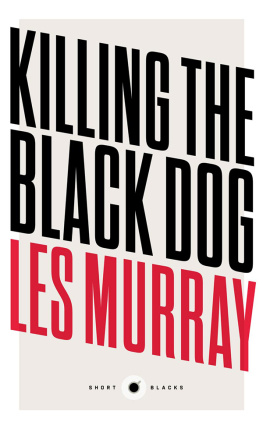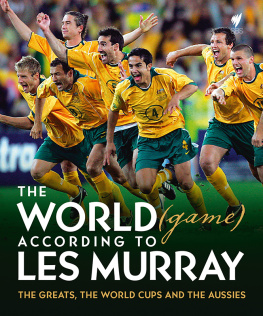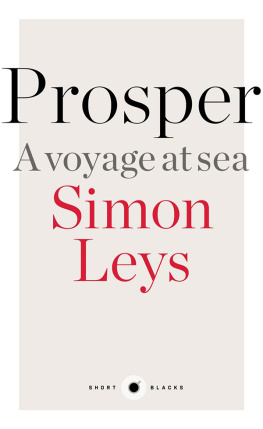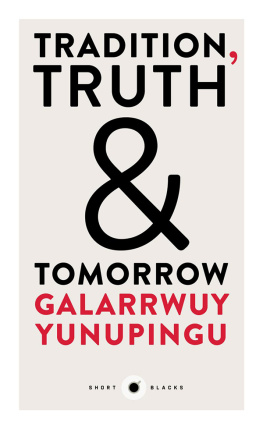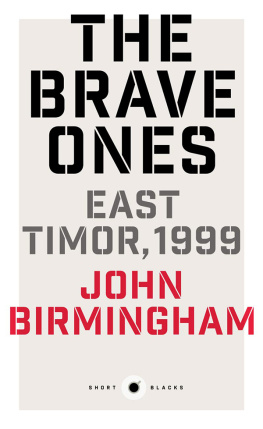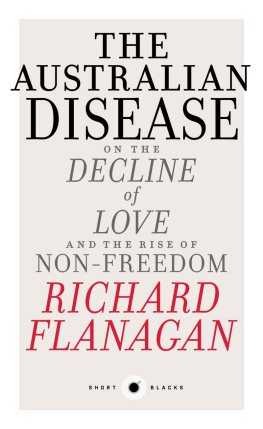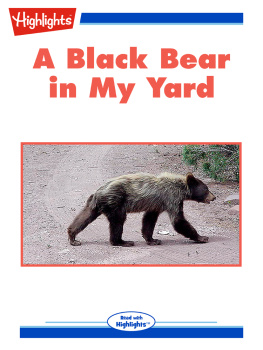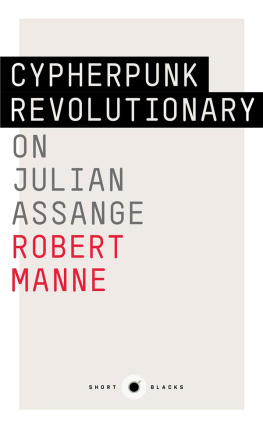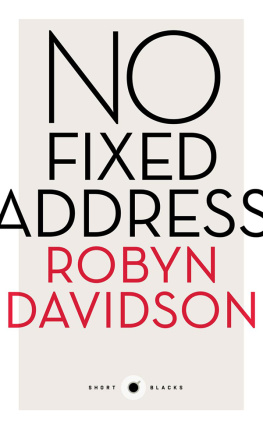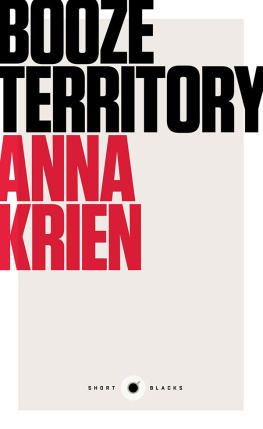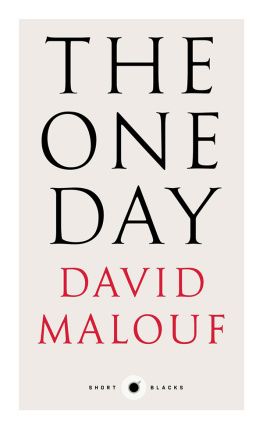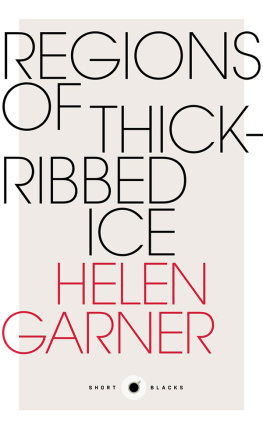SHORT BLACKS are gems of recent Australian writing brisk reads that quicken the pulse and stimulate the mind.
SHORT BLACKS
1 Richard Flanagan The Australian Disease:
On the decline of love and the rise of non-freedom
2 Karen Hitchcock Fat City
3 Noel Pearson The War of the Worlds
4 Helen Garner Regions of Thick-Ribbed Ice
5 John Birmingham
The Brave Ones: East Timor, 1999
6 Anna Krien Booze Territory
7 David Malouf The One Day
8 Simon Leys Prosper: A voyage at sea
9 Robert Manne
Cypherpunk Revolutionary: On Julian Assange
10 Les Murray Killing the Black Dog
11 Robyn Davidson No Fixed Address
12 Galarrwuy Yunupingu
Tradition, Truth and Tomorrow
Published by Black Inc.,
an imprint of Schwartz Publishing Pty Ltd
3739 Langridge Street
Collingwood VIC 3066 Australia
www.blackincbooks.com
Copyright Les Murray 2009
Les Murray asserts his right to be known as the author of this work.
First published in Killing the Black Dog, Black Inc., 2009.
This edition published 2015.
ALL RIGHTS RESERVED.
No part of this publication may be reproduced, stored in a retrieval system, or transmitted in any form by any means electronic, mechanical, photocopying, recording or otherwise without the prior consent of the publishers.
National Library of Australia Cataloguing-in-Publication entry:
Murray, Les A. (Les Allan), 1938, author.
Killing the black dog / Les Murray.
9781863957724 (paperback) 9781925203585 (ebook) Short blacks ; no.10.
Murray, Les A. (Les Allan), 1938. Depressed personsAustraliaBiography. Depression, MentalAustralia.
616.85270092
Cover and text design by Peter Long.
LES MURRAY has published some thirty books, most recently Waiting for the Past and On Bunyah. His work has been translated into many languages. In 1996 he was awarded the T.S. Eliot Prize.
O n the last day of 1985, I went home to live in Bunyah, the farming valley I had left some twenty-nine years earlier. My wife and our younger children followed two days later. My father had acquired an old forty-acre selectors block some ten years previously, and wed built a house for him and for family visits from Sydney. In 1981, wed extended this in preparation for a move which then got delayed by a family emergency, the diagnosis of autism in our fourth child. But now at last I was going home, to care for my father in his old age and to live in the place from which Id always felt displaced. What I didnt know was that I was heading home in order to go mad.
All went well for the first year and most of the second. My wife had agreed to move on a years trial, but after a couple of months she said she loved the new life and would stay indefinitely. We found better school arrangements for Alexander than any wed found in Sydney after hed finished with the Autistic Associations marvellous special school in Forestville. Modern communications made it just as easy for me to carry on my writing career out of Bunyah as out of Sydney; a great change that had occurred in my absence was that, where once you had to be a housewife, farmer, farm worker or timber hand to live in the bush, now all sorts of trades and none were followed there without social pressure. At first I suffered no more than the normal background depressiveness of a writer, plus the irritable defensiveness that came from a bitter division in the literary world which had begun in the late 1960s, between the so-called Generation of 68 and those who served it throughout the Australian cultural world and a minority of us whom it demonised as its opponents. The tears which had appeared as an absolute in a mysterious figure who wept in Martin Place, in a poem called An Absolutely Ordinary Rainbow, which Id written a few years after my first depressive breakdown at the end of the fifties, now seemed to have dried in my imagination. I enjoyed discovering that I was still attuned to the wry subtleties of conversation around my region, though Id missed a whole generation of my friends and cousins kids. But if home conceals Old Bad Stuff you had not mastered the first time around, going back there, perhaps especially as you approach your fifties, is an invitation to crisis. Mine started with a well-attended poetry reading at the bowling club in Taree in early 1988.
In many ways, it was a triumph for a local celebrity. The member of parliament for our electorate was there, the dignitaries of all the service clubs were there at the end of the evening, I was presented with the Paul Harris Fellowship of Rotary International, which I understand is a rare honour for a non-member of the organisation and upwards of a hundred and fifty guests had come to hear me. Among them was a former schoolmate from the Leaving Certificate class of 1956 at Taree High School. This woman cheerfully recalled to me one of the nicknames she had bestowed on me thirty-odd years previously, and within a day or two I began to come apart. I started to suffer painful tingling in my fingers, I began to slip into bouts of weeping as I drove my car What the hell is this? I asked myself, but the cause of the tears wouldnt come into focus. In the middle of that year, my ongoing breakdown threw up a very happy symptom: cigars suddenly gave me up. From being an eight-cigar-a-day smoker, I suddenly became unable to endure the taste of tobacco; it was worse than burning rubber, and this change has been lasting. Around the same time, savage indigestion racked me throughout a fortnights tour in Ireland, then ebbed away; Id never previously suffered this complaint at all. Id always led a crowding mental life, but now my mind became congested, jammed with ideas I couldnt formulate clearly or nimbly enough, so that they tumbled over each other and made me incoherent. During a weeks residency at La Trobe University around September that year, I faced at a seminar a nasty post-graduate student who had published an insulting study of my work, mocking me for grief at my mothers death many years before, and I found I couldnt denounce him effectively, or defend myself. I did go on writing poetry during this whole period, however, and the last poem I wrote before the crisis which would get my illness diagnosed was the title poem of a book called Dog Fox Field (1990). Several poems in the latter part of that book reflect my mental state, being over-concentrated and under-explained in ways not caused by experiment.
Driving home from La Trobe, I had several readings to give, and I managed to give them without trouble. In Canberra, I scored a parking ticket, which my wife got me off on a plea of insanity. Because just after my fiftieth birthday, I went to her complaining of chest pains and she drove me to Casualty at Taree Base Hospital. From my slow steady pulse, she deduced that I wasnt having a heart attack at all, but you dont ignore chest pains, and anyway I was badly in need of reassurance. Casualty took one look at my corpulence and my greying bald head and put me onto the monitor and an intravenous drip; within half an hour I found myself among the truly sick on the hospitals fourth floor, in the cardiac ward. It has the best view in its small city, but few up there are looking. Gooday, Les, said a voice I hadnt heard since my early teens at Nabiac Central School. Remember me? Im Arthur Bussey. I do remember you, Arthur. How are you, if thats not a silly question? Im all right now, but see that table over there? I died four times on that bastard the other night. The old shockers brought me back, though. Right after that, the duty priest turned up and offered me the last rites of the Catholic Church. I wavered for a moment, not sure whether things were that serious; my chest pains had mysteriously vanished. If youre on this ward, youre serious enough! the Father said brusquely, and fetched out his anointing oils.
Next page
